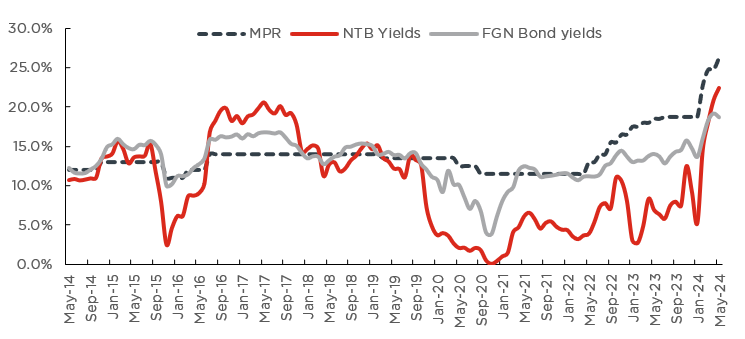- As MPC Hikes MPR By 150bps To Check Inflation Surge
The Central Bank of Nigeria (CBN) Monetary Policy Committee (MPC), on Tuesday concluded its third meeting for this year, and voted unanimously to further raise its benchmark Monetary Policy Rate (MPR) by 150 basis points to 26.25%, in what it said was mainly aimed at achieving price stability by effectively deploying available tools to rein in inflation.
Unlike in the past meetings, since the new team came on board, the MPC kept other parameters such as the asymmetric corridor around the MPR, the Cash Reserve Requirement (CRR) for Deposit Money Banks (DMBs), and the liquidity ratio unchanged at +100bps/-300bps, 45.0%, and 30.0% respectively.
The decision, the committee said in a communique issued at the end of the meeting and signed by Olayemi Cardoso, its chairman and CBN Governor, was based on a review of recent economic, financial developments, and assessment of risks to the its earlier outlook. It acknowledged “the persistently elevated inflation risks and the necessity to consolidate the gains from previous rate hikes.”
Reacting to the latest MPR hike, analysts at Cordros Capital, a Lagos-based investment banking group, in a note to clients, expect equity investors to continue cautious trading with a weak appetite for stocks.
In the aftermath of the further hike, Cordros’ analysts say they “expect investors to continue cherry-picking stocks while closely monitoring subsequent Treasury bills and bond auctions to gauge the movement of yields in the fixed-income market,” even as macroeconomic developments and corporate actions . shape the overall equity market direction in the medium term.
Given the expected continued increase in interest rates, it advised “investors to remain cautious about investing in long-duration instruments, which currently may not offer fair compensation for the risks of rising rates.
“Thus, we maintain our expectations that yields in the fixed-income market are bound to increase further from current levels. Our prognosis is further buoyed by the expectation of a sustained imbalance in the supply and demand dynamics in the fixed-income market,” the analysts added..
Cordros also believes that the outcome of the meeting may trigger further rounds of bearish sentiments across the mid-to-long end of the yield curve in the fixed income market, even as Wednesday’s NTB auction could offer more clarity on the direction of yields in the secondary market.
Adducing reasons for its decision, the MPC expressed optimism about GDP growth, upholding its forecast of 3.38% for 2024, despite heightened inflationary pressures and tight monetary conditions, as evidenced by the improvement in the Composite PMI numbers. Although still elevated, members attributed the persisting inflationary pressure to “exchange rate pass-through, high logistics costs, and food shortages induced by heightened insecurity in the food-belt region.”
They, nonetheless acknowledged the moderation in month-on-month headline inflation numbers, linking it to the impact of its monetary policy tightening on consumer prices.
“The Committee expects inflationary pressures to remain high in the near term, indicating that inflation risks are elevated,” observing that food inflation remains the key pressure point.
It blamed this on challenges such as the rising cost of transporting farm produce; infrastructure-related constraints along the distribution chain; insecurity in some food producing areas; and exchange rate pass-through to domestic prices for imported food items.
Members called for more efforts to address insecurity in farming communities for improved food production, just as members lamented the recent volatility in the forex market, which they attributed to seasonal demand, blamed on the interplay between demand and supply in a freely functioning market system.
“The committee noted with satisfaction that the banking system remains safe, sound, and stable, despite the headwinds confronting the economy,” while commending the recent recapitalization initiative while urging the management to sustain its regulatory oversight and ensure the continued stability of the banking system.








